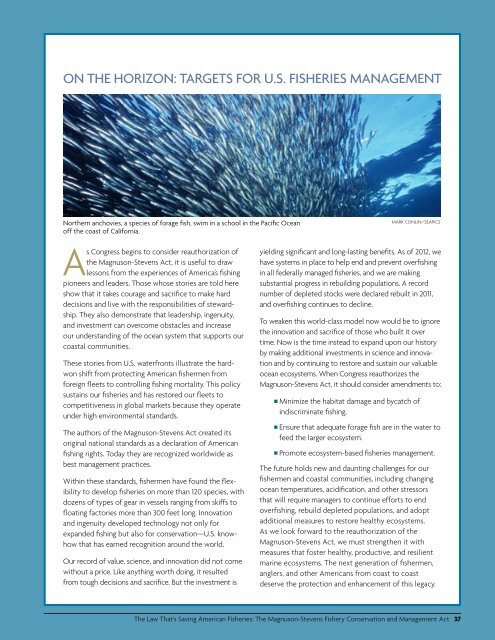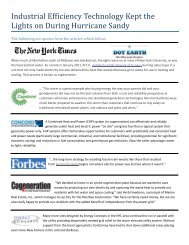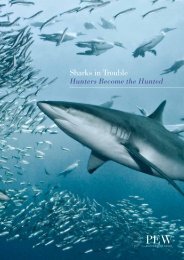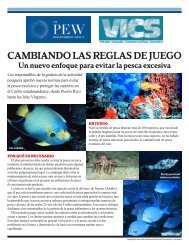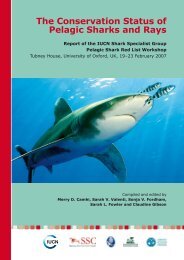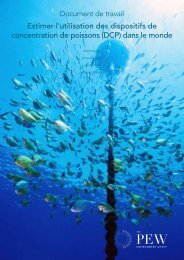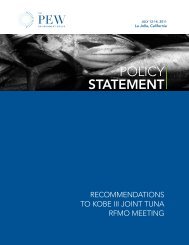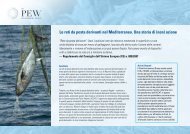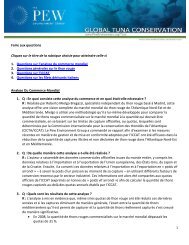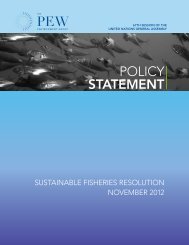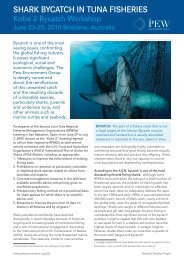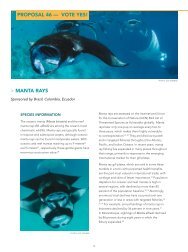The Law That's Saving American Fisheries - Ocean Conservancy
The Law That's Saving American Fisheries - Ocean Conservancy
The Law That's Saving American Fisheries - Ocean Conservancy
Create successful ePaper yourself
Turn your PDF publications into a flip-book with our unique Google optimized e-Paper software.
On the horizon: Targets for U.S. fisheries management<br />
Northern anchovies, a species of forage fish, swim in a school in the Pacific <strong>Ocean</strong><br />
off the coast of California.<br />
Mark Conlin/SeaPics<br />
As Congress begins to consider reauthorization of<br />
the Magnuson-Stevens Act, it is useful to draw<br />
lessons from the experiences of America’s fishing<br />
pioneers and leaders. Those whose stories are told here<br />
show that it takes courage and sacrifice to make hard<br />
decisions and live with the responsibilities of stewardship.<br />
<strong>The</strong>y also demonstrate that leadership, ingenuity,<br />
and investment can overcome obstacles and increase<br />
our understanding of the ocean system that supports our<br />
coastal communities.<br />
<strong>The</strong>se stories from U.S. waterfronts illustrate the hardwon<br />
shift from protecting <strong>American</strong> fishermen from<br />
foreign fleets to controlling fishing mortality. This policy<br />
sustains our fisheries and has restored our fleets to<br />
competitiveness in global markets because they operate<br />
under high environmental standards.<br />
<strong>The</strong> authors of the Magnuson-Stevens Act created its<br />
original national standards as a declaration of <strong>American</strong><br />
fishing rights. Today they are recognized worldwide as<br />
best management practices.<br />
Within these standards, fishermen have found the flexibility<br />
to develop fisheries on more than 120 species, with<br />
dozens of types of gear in vessels ranging from skiffs to<br />
floating factories more than 300 feet long. Innovation<br />
and ingenuity developed technology not only for<br />
expanded fishing but also for conservation—U.S. knowhow<br />
that has earned recognition around the world.<br />
Our record of value, science, and innovation did not come<br />
without a price. Like anything worth doing, it resulted<br />
from tough decisions and sacrifice. But the investment is<br />
yielding significant and long-lasting benefits. As of 2012, we<br />
have systems in place to help end and prevent overfishing<br />
in all federally managed fisheries, and we are making<br />
substantial progress in rebuilding populations. A record<br />
number of depleted stocks were declared rebuilt in 2011,<br />
and overfishing continues to decline.<br />
To weaken this world-class model now would be to ignore<br />
the innovation and sacrifice of those who built it over<br />
time. Now is the time instead to expand upon our history<br />
by making additional investments in science and innovation<br />
and by continuing to restore and sustain our valuable<br />
ocean ecosystems. When Congress reauthorizes the<br />
Magnuson-Stevens Act, it should consider amendments to:<br />
Minimize the habitat damage and bycatch of<br />
indiscriminate fishing.<br />
Ensure that adequate forage fish are in the water to<br />
feed the larger ecosystem.<br />
Promote ecosystem-based fisheries management.<br />
<strong>The</strong> future holds new and daunting challenges for our<br />
fishermen and coastal communities, including changing<br />
ocean temperatures, acidification, and other stressors<br />
that will require managers to continue efforts to end<br />
overfishing, rebuild depleted populations, and adopt<br />
additional measures to restore healthy ecosystems.<br />
As we look forward to the reauthorization of the<br />
Magnuson-Stevens Act, we must strengthen it with<br />
measures that foster healthy, productive, and resilient<br />
marine ecosystems. <strong>The</strong> next generation of fishermen,<br />
anglers, and other <strong>American</strong>s from coast to coast<br />
deserve the protection and enhancement of this legacy.<br />
<strong>The</strong> <strong>Law</strong> That’s <strong>Saving</strong> <strong>American</strong> <strong>Fisheries</strong>: <strong>The</strong> Magnuson-Stevens Fishery Conservation and Management Act 37


